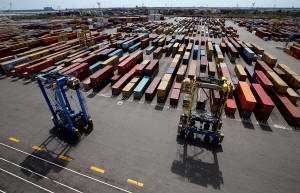German economic weakness belies France's outperformance
 Send a link to a friend
Send a link to a friend
 [September 12, 2023] By
Leigh Thomas [September 12, 2023] By
Leigh Thomas
PARIS (Reuters) - Germany's economic weakness is casting a flattering
light on France's relative resilience that belies the otherwise middling
performance of the euro zone's second-biggest economy, economists say.
The European Commission said on Monday the two economies were on
diverging paths this year with Germany forecast to be in a recession
with a 0.4% contraction and France expected to grow 1.0%.
With weak construction and declining construction investment weighing on
Europe's biggest economy, Germany's outlook was slashed from a previous
forecast for 0.2% growth while France was upgraded from 0.7%.
However, France's improved outlook stems in no small part from a
particularly strong second quarter when the economy grew 0.5% thanks to
exceptionally strong exports of aircraft and the delivery of an ocean
liner, not to mention a boost from firms rebuilding inventories.
"Germany's not doing very well, that's for sure, but to say that means
France is doing well would be pushing it," said Mathieu Plane with the
OFCE economics think tank in Paris.

The contrasting fortunes of the euro zone's two biggest economies can
also be explained by tailwinds working against Germany and headwinds
helping France.
Germany's manufacturing-focused economy is struggling to adapt to being
cutoff from cheap Russian gas and the rise of the electric vehicle, said
Charles-Henri Colombier with the Rexecode economics think tank in Paris.
Germany's gas-hungry chemical industry has seen production fall 18% from
2019 levels while in France it is only 8%, Colombier said. Meanwhile,
German motor vehicle production is down 26% and only 6% in France.
"France is still benefitting from lingering post-COVID phenomena that
don't have a corollary in Germany," Colombier said, citing record summer
tourism numbers and a rebound in Airbus orders as air travel continues
to bounce back.
[to top of second column] |

Cranes move shipping containers stacked along the dockside at the
Seayard Co. terminal, operated by the Marseille-Fos port authority
in Fos sur Mer, France, April 20, 2016. REUTERS/Jean-Paul Pelissier//File
Photo

Additionally, the strength of the French labour market has
repeatedly surprised economists but is nonetheless widely expected
to soften as firms shift down in response to weak confidence in
their business outlooks.
That leaves few props to lend support to French growth going forward
other than household savings. In the second quarter the household
savings rate -- the portion of disposable income that is not spent
-- reached nearly 19% and could boost spending if consumers bring
the rate back to more normal levels around 15%, Plane said.
"We can expect growth to be very modest in 2024," he added.
In preparation for the release of the 2024 budget bill at the end of
the month, France's Finance Ministry is due to publish its updated
economic forecasts in the coming days.
The ministry is widely expected to cut the 1.6% forecast it has had
until now for 2024 as growth slows in many of France's major trade
partners - first among them Germany.
But unlike Germany, France cannot count on the public finances
offering support as the French government has recommitted to reining
in spending, which surged to record levels during COVID and remained
high during last year's energy price crisis.
"Structurally Germany has gigantic budget leeway. In that context,
the question is how is Germany going to react," Plane said.
(Reporting by Leigh Thomas, Editing by William Maclean)
[© 2023 Thomson Reuters. All rights
reserved.]
This material may not be published,
broadcast, rewritten or redistributed.
Thompson Reuters is solely responsible for this content.
 |